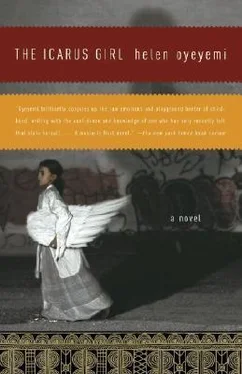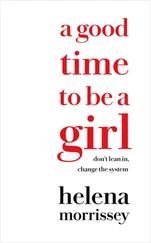She did not know what was expected of her.
She had nearly reached him when suddenly, on an outward gust of air, he half said, half announced a name.
“Wuraola.”
Who?
She froze, not knowing what to say or do.
Of course, she knew that Wuraola was her Yoruba name, the name that her grandfather had asked in a letter for her to be called when her mother had held her Nigerian naming ceremony. Wuraola means gold.
She knew all this. .
But nobody had ever called her Wuraola, not even her mother, whom she could now see from the corner of her eye making anxious, silent gestures for her to go to her grandfather.
Here, in this stone-walled corridor where the sunlight came in through enormous, stiff mosquito screens over every window and her clothes clung to her like another skin, Wuraola sounded like another person. Not her at all.
Should she answer to this name, and by doing so steal the identity of someone who belonged here?
Should she. . become Wuraola?
But how?
She could not make herself move forward, so she stayed where she was, avoided his touch, looked up into her grandfather’s face, smiled and said quietly, but firmly, in her most polite voice “Hello, grandfather.”
After they had taken baths, and Jess had been made to eat a little, her mother disappeared with her youngest sister, Aunty Biola, and her father befriended Uncle Kunle, who was clearly as newspaper-minded as he was, and wanted to talk about politics. Swiftly dropping a kiss onto her forehead, her father released her into her grandfather’s clutches before mounting the stairs that led up to the roof balcony of the house, gesticulating wildly as he spoke, clutching a bottle of Guinness with his free hand. Her uncle followed closely behind, pointing downwards as if at some artefact that would prove him right beyond doubt, and saying emphatically, “No, no, it’s quite clear to me and to everyone that the reason why they don’t want Abiola for president is because he’s a Yoruba man!”
So her grandfather did have a face. It was a broad, lined face; the smile and frown lines ran deep into his skin, his eyes made smaller by the loosened flesh around them. He had the same wide, strong jawline with the determined set as her mother, and the same prominent cheekbones, although Jess could see that his were made angular more through the emaciation of age than anything else. He was quite short and moved about very quickly. He didn’t have a walking stick.
As Jess sat in the parlour, keeping very still so that she wouldn’t take up much space on the brown-and-white sofa, she allowed herself to stare openly and seriously at her grandfather, and he did the same. She felt as if she were a little piece of him that had crumbled off maybe, which he was examining for flaws and broken bits before deciding whether it was worth taking it to be reattached. It was impossible to tell what he thought of her.
She sat at a right angle from him, breathing out silence. He sat very upright (like her, she noted, with surprise), his hands on his knees, the crisp lines of his white shirt almost moulding him, fixing him still in her sight. They were both waiting, supposedly for her Aunty Funke to bring them some soft drinks (her grandfather had called them “minerals”), but really Jessamy sensed that they were waiting to see if they would like each other or not. She stared at him wide-eyed, unaware that she looked overly anxious with her bottom lip jutting out slightly below the top one. She sensed herself on the edge of a screaming fit, already beginning to hear her breath coming faster than usual, feel the flat tightening at the bottom of her stomach. She tried desperately to quash it. She couldn’t, wouldn’t, mustn’t, start screaming at her grandfather. He was not like her English granddad at all. He was. . someone, something, else, more hidden.
Finally, he smiled, and although his smile was bumpy because some of his teeth were jagged and broken, it was a warming, infectious smile that was reflected in his eyes. It made her smile widely in return. She felt as if the room had been lit up. He held out his arms, and she went across the room to him, almost running. She buried her face in his shirt, her nose wrinkling up as the scent of his cologne mixed with the nutty, sourish smell of camphor that filled the room. He put his arms around her, but gently, so that there was space between his forearms and her back, holding her as if she was too fragile to hug properly. Awkwardly, he patted her light, bushy aureole of dark brown hair, repeating, “Good girl. Fine daughter.”
Her grandfather’s words had a lyrical quality to them, and she felt lulled, as if she really could be Wuraola, this good girl, this fine daughter. She wondered, briefly, why her mum allowed some people to call her Sarah, and others to call her Adebisi.
Aunty Funke entered the room with a swish of cloth that smelt of Sunlight soap. Jess already knew her smell, but didn’t look up from the starched white before her eyes. She heard the clink of the glass bottles being placed on the round table in the centre of the parlour, heard Aunty Funke speaking rapidly in rough, cascading Yoruba. Her grandfather replied quietly, moved a hand to beckon at Aunty Funke to open a bottle.
“What do you want to drink, Wuraola?”
Hearing his words rumble through his chest, she lifted her head and looked at bottles placed on the oval tray. Aunty Funke stood smiling indulgently at her, the bottle opener in one hand, the other hand paused to seize a bottle from the selection. Jess pointed at the Coke.
She looked into her grandfather’s face again as they both waited for the hissing sound of gas escaping the bottle, and they both flinched a little from the sheer nakedness of contact between eye and eye. It wasn’t unpleasant flinching, but the surprised movement of two who are accustomed to looking closely at other people, but unaccustomed to being seen.
She noticed that her drink tasted stronger, richer, more Coke-y than the cola at home, and she gulped the sweet liquid down eagerly, the taste becoming intermingled somehow with the framed map of Africa on the painted but peeling wall opposite her, the lion-shaped bronze clock, the shapes chasing each other around the neck and sleeves of Aunty Funke’s well-fitting boubou . She could faintly hear the sound of her cousins playing out front, the younger ones shrieking over the sound of a ball going smack smack smack against the concrete of the floor. Her aunt took a seat and began asking her questions, but as usual she was too overwhelmed by taste and colour to speak properly. She could not say very much about herself and whether or not she liked Nigeria so far, because as yet, she knew nothing about anything. Her embarrassed silence spread out like a little pool towards her aunt, and soon her aunt rose and bustled out of the room, making some excuse in Yoruba to her grandfather.
Left alone again, Jessamy and her grandfather sat quietly, her arms now flung around his neck as she marvelled at how at ease she had begun to feel with him. Then, remembering her grandparents in England, she shuddered slightly, wondering if this grandfather would understand that sometimes people needed to have lights on.
“Wuraola, can it be that you are cold?”
Her grandfather sounded amused.
Jess shook her head vigorously, laughing as she did so. Cold! Here?
She looked to the doorway, over which was hung a cascade of vertically arranged brown-and-cream sandalwood beads. They were still swinging from the impact of her Aunty Funke’s passing through, and you could see chinks of the landing through them. She could see patches of something else, too. Three of her cousins — she couldn’t see clearly which ones, or even if they were boys or girls — stood there, peering curiously through at her, as she sat on their grandfather’s lap.
Читать дальше












